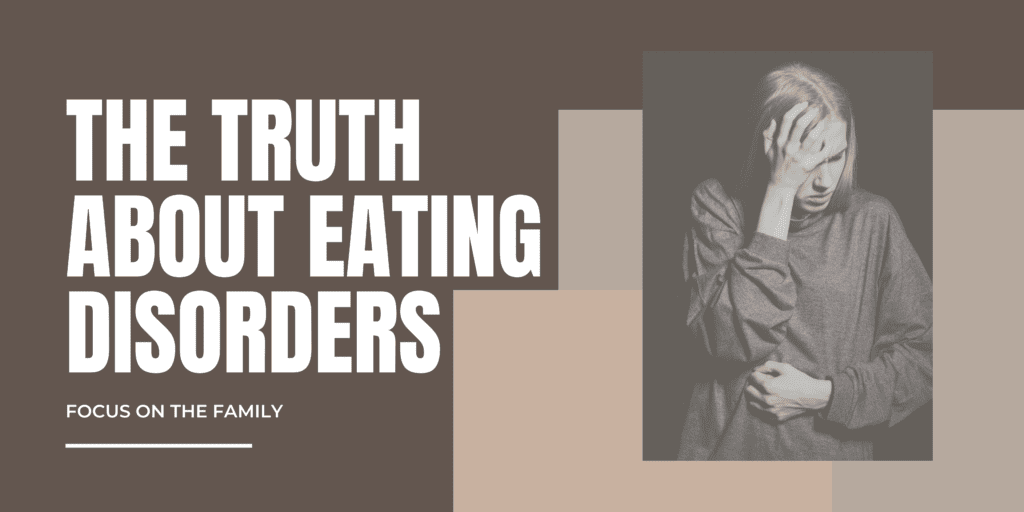
When Love Is Broken: 3 Things to Remember When Your Spouse Breaks Your Trust
After my husband confessed his pornography addiction, I wondered if I could ever love him again. But we fought for love — and won.

Learn what causes eating disorders, what the root of the problem is, factors that could lead to the development of an eating disorder, what the Bible says about beauty and how to avoid the trap of eating disorders.
The truth about having an eating disorder is it feels lonely. Eating disorders bring about feelings of shame, leaving the sufferer to feel disconnected from others. By raising awareness and diving into the truth of how eating disorders arise, parents can begin to create an environment where their children feel safe to share their struggles.
Content Caution: This article offers a candid look at eating disorders. Some aspects of the discussion may prove difficult for sensitive readers.
Sometimes the demands of a sport or pressure from peers and family feed the disorder. Often times family systems issues can play a role in a teen developing an eating disorder. Other times, teens don’t know how to react to the physical changes that come with adolescence and they panic, desperately trying to stop this natural, healthy weight gain. Still other teens use food and weight-control to get attention or bring stability to a world that seems to be in chaos. No matter their roots, eating disorders are dangerous and hurtful to bodies, emotions and relationships. If you or your child is struggling with an eating disorder, keep reading. You will find help and hope in solid information and in the stories of those who have fought this battle and won.
According to studies by the EDC (Eating Disorders Coalition), here are some general facts about eating disorders.
An eating disorder is an unhealthy way of using food to cope with psychological stress. As defined by the DSM-5 (Diagnostic & Statistical Manual of Mental Disorders, Fifth Edition), an eating disorder is “characterized by a persistent disturbance of eating or eating-related behavior that results in the altered consumption or absorption of food that significantly impairs physical health or psychosocial functioning.”
If you or your child is fighting this battle, it may present in one of the following eating disorders as defined by Eating Disorder Hope:
The following eating disorders are some of many ways an eating disorder may present itself. According to the Mayo Clinic, the most common eating disorders are anorexia nervosa, bulimia nervosa, and binge-eating disorder. For an extensive list and information on treatment, visit Timberline Knolls.
Anorexia nervosa: “Restriction of energy intake relative to requirements, leading to significantly low body weight in the context of age, sex, developmental trajectory, and physical health. There is an intense fear of gaining weight or of becoming fat, or persistent behavior that interferes with weight gain, even though at a significantly low weight. Creates a disturbance in the way in which one’s body weight or shape is experienced, undue influence of body weight or shape is experienced, undue influence of body weight or shape on self-evaluation, or persistent lack of recognition of the seriousness of the current low body weight.”
Bulimia nervosa: “Recurrent episodes of binge eating, which are characterized by BOTH of the following:
Recurrent, inappropriate compensatory behaviors in order to prevent weight gain, such as self-induced vomiting; misuse of laxatives, diuretics, or other medications; fasting; or excessive exercise. The binge eating and inappropriate compensatory behaviors both occur, on average, at least once a week for 3 months. Self-evaluation is unduly influenced by body shape and weight.”
Binge Eating Disorder: “Recurrent episodes of binge eating, which are characterized by BOTH of the following
The binge-eating episodes are associated with three (or more) of the following:
Marked distress regarding binge eating is present. The binge eating occurs, on average, at least once a week for 3 months. The binge eating is not associated with the recurrent use of inappropriate compensatory behavior as in bulimia nervosa. Binge eating usually does not occur exclusively during the course of bulimia nervosa or anorexia nervosa.”
Orthorexia: “An obsessive focus on “healthy” eating and avoidance of “unhealthy” foods, mental preoccupation regarding dietary practices, and very rigid dietary rules with violations causing exaggerated emotional distress (fear of disease, anxiety, shame, and negative physical sensations).”
It’s easy to see that these disorders are disastrous for your health. In addition to destroying your body, eating disorders often cause depression and confusion, harm relationships with family and friends, and produce a sense of separation from God. Why? While anorexia and bulimia may have distinct physical symptoms, they’re really a matter of emotional and psychological wounds that show up in physical ways.
Factors leading to an eating disorder are often a mix of both internal and external issues. Listed below are some potential factors as stated by Eating Disorder Hope.
Although the presence of these issues in your life doesn’t guarantee you’ll develop an eating disorder, it does place you at a higher risk. There is no foolproof way to guess who will struggle with an eating disorder. People who develop eating disorders come from every race, religion, and economic background. However, there are some common warning signs. If you’re concerned about yourself or your teen, ask the following questions:
Discovering these signs in your own life or in the life of your child can be overwhelming. You may have a sense of sliding down a dangerous slope and not being able to stop. On the other hand, seeing these symptoms in the life of someone close to you may be confusing. What makes your child or teen act the way he or she does?
Sometimes understanding the source of emotional stress is the best way to begin dealing with an eating disorder. If you’re the one struggling, this knowledge can help you look at your pain more objectively and fight it in a way that’s healthier than disordered eating. If you’re watching a child battle anorexia or bulimia, understanding where he or she is coming from can help you to respond in a caring, constructive way.
Parents, this is where you need to take a moment and look at your life. Do you as the parent resonate with any of the descriptions or questions above? Self-awareness is the best way to help understand the root of the problem in your life and in the life of your teen if they are struggling with an eating disorder. Becoming aware of your thought patterns, whether they be negative or controlling can show potential areas where your teen is feeling overwhelmed with pressure.
Some places eating disorders can take root include:
If you or your teen is struggling with an eating disorder, the biggest thing to remember is the battle is not with food, it is an emotional struggle with something else. The eating disorder is a product of a deeper struggle.
Noticing the presence of these roots can help you and your family pivot in order to prevent you or your child from developing an eating disorder.
Eating disorders are beginning to appear in children earlier and earlier. Creating an emotionally healthy family environment is your best weapon against the development of an eating disorder. Be aware of how your family discusses weight, exercise, and diet culture.
You may begin to notice signs of an eating disorder as early as eight years old. Though this seems young, your kids can desire having a sense of control at a young age. It is not as common to see 4-8 year olds struggle with an eating disorder, but it is possible.
As your child gets older, take note of what they are feeling. 9-12 year olds are starting to see the social pressures of having certain types of bodies. Pressures from peers, school, and home may begin to build up and your child may turn to an unhealthy path in order to gain a sense of order in their life.
Once your child gets to their teenage years, 13-18, more of these emotional stresses can take place. Your teen is more aware of their environment. They will notice struggles at home and school more acutely, which can in turn make them feel as though they need to aim for perfection in an imperfect world.
From rapid physical development to the need for love and attention, emotional trauma can come from lots of sources. Let’s take a deeper look at some of the primary stresses that contribute to eating disorders.
As parents, it is important to be aware of the physical changes that happen during adolescence. It may seem like a no-brainer, but along with all this growth and change comes a natural increase in weight. Be open to discussing these changes with your children.
Between ages 11 and 16, most girls grow 7 to 9 inches and gain 35 to 50 pounds. Most boys grow 10 to 12 inches and gain 40 to 80 pounds. Even though this is perfectly normal, the sudden increase in weight scares some teens into thinking they’re “getting fat.”
To complicate things even more, weight gain and height growth are not perfectly synchronized, so almost everyone will go through phases of being chubby or awkwardly skinny at some point during adolescence. Help your teen to relax. Encourage them to take good care of their body, not because they need to look a certain way, but because the Lord cares for them and doesn’t want them to hurt themselves. Remind them that soon the ups and downs will level off into a more stable adult size and shape.
If your family has a history of being overweight, it is important to maintain a balance of healthy eating and exercise. The key word here is balance! If your teen has worries, remind them of the truth of their worth. Exercising compulsively can be just as unhealthy as anorexia or bulimia. Anytime one area of your life causes you to obsess, it’s an indication that something is wrong.
Normalize the changes your children are going through, remember you are setting the tone within your household. As your teens go through these adolescent changes, turn the focus away from diet, weight, and exercise.
Instead, help your child build healthy habits. Encourage them to create good relationships and community. Remind your teens where their worth comes from and tell them truth when their minds wander to negative body talk. Be intentional about having a healthy environment where your children can feel safe to discuss topics such as body image and bodily changes.
Athletes are usually among the most disciplined and fit of all people. Unfortunately, the rigid standards of some sports and the unrealistic expectations of some coaches and parents can drive young athletes to practice unhealthy dieting habits.
According to Eating Disorder Hope, “While about 1%-5% of the general population is at risk for developing an eating disorder such as anorexia or bulimia, that number can be as high as 30% for competitive athletes.” This is especially true in sports where being small or thin is a competitive advantage.
These sports are deemed high risk because of the “lean” and “aesthetic” aspect of each of these sports.
If your child or teen is in one of these sports, don’t panic. Be aware of the possibilities and maintain an open and authentic home environment so your child can share how they are feeling.
Male athletes may not go through the same emotional distress that many females with eating disorders experience. A girl’s identity and self-worth often becomes closely tied to her success at shedding pounds, especially as it relates to her sport. However, for guys, a certain weight may be a required goal to meet in order to do well athletically. Even if guys don’t get psychologically addicted to losing weight the way girls do, they may create permanent harm to their bodies through unhealthy dieting to get to a desired goal weight. Your son may struggle with body image, so be aware that it will look different than the “classic” eating disorder such as anorexia or bulimia.
Whether your teen is a girl or a guy, being an athlete won’t automatically cause them to have an eating disorder. In fact, some team sports actually protect against them. But you will need to be extra cautious so your child won’t fall into that trap. If your child chooses to participate in the “high risk sports” (gymnastics, figure skating, dancing, synchronized swimming, wrestling), help keep your child accountable and continue to open the door for difficult conversations should they need to discuss potential pressures they may be facing. Encourage them to be open about what they are feeling as they participate in their sport.
Some teens who fall into an eating disorder have the desperate feeling that no one loves or even notices them. They may feel neglected and abused, and food becomes a way to bring control back to their lives. Sometimes a traumatic experience or loss is at the root of their struggle. Others start losing weight to look good and then discover that the rapid weight loss gets them lots of attention.
So the cycle continues, they keep losing weight. Even when they know it’s unhealthy, they want to elicit more attention from you as their parents, doctors, or counselors. Most commonly, teens feel that if they can just reach a certain size and weight, they’ll be accepted by those around them.
Ultimately, your teen, like most of us, is hungry for deep, meaningful relationships. As humans, we are created for relationships, specifically a relationship with our Creator. Help your child express how they are feeling by asking them questions. Your teen cannot control a lot of things, so in the midst of searching for meaningful relationships, food is where they may land to gain a sense of control.
If your child or teen is having a hard time discussing their thoughts and feelings, use a feelings chart to help identify how they are feeling. When you help identify thoughts and feelings, you can help locate the lies they are believing about themselves. When you shine a light on lies they believe, the darkness of the lie has to flee. Giving a space to understand and discuss feelings is one of the best things you can do for your child who is potentially struggling.
Why do so many teens turn to food-control as a source of stability, attention, and acceptance? Why does body image have so much to do with our self-worth? While there’s no simple explanation, part of the answer is that we live in a world that places excessive value on looking good, being thin, and staying in style.
But wait! Who decides how thin is thin enough? And who sets the standards for what “beautiful” means?
The people who determine society’s standards of beauty haven’t had some magical revelation of what perfection is. They just happen to control the diet, fitness, fashion and cosmetic industries. The message they’re sending is “perfection is possible, if you use our products.” Sex appeal sells, so TV and movies also profit from promoting the lies that beauty equals success, perfection is attainable, and that thinness leads to happiness.
Sadly, many people are buying into these lies. What happens when the diet doesn’t work, or worse, when it does work, but the results still aren’t satisfying? Girls and boys are setting themselves up for an eating disorder. They’ve been given an unrealistic idea of what is beautiful or even normal. They’ve tried to reach that ideal and failed. They’re willing to do destructive things to their bodies in order to achieve that image at all costs.
No matter how much your teen is being bombarded by the lies, don’t let them buy into the lies. Help your children learn to pick apart the messages they’re receiving from society. As parents, listen to the phrases your teen says. Listen for details of lies they are believing, lies are in the details. Help by telling them truth found in scripture.
Having healthy discussions about body image within your household can give your children a more realistic view of what is normal and beautiful. Challenge the things society says about body image, remain authentic with your kids. Discuss your children’s worth through a biblical lens, rather than letting the world’s broken standards tell them who they are.
Since standards of beauty change so rapidly, is it really worth our time, effort and tears to conform to them? No! It’s not worth doing permanent damage to your body to live up to a standard that will probably change within a decade. As parents, the thoughts above can be easy for us to listen to. In the mind of your child however, the standards of today feel present and the feelings attached to those standards feel massive.
Acknowledge how your teen feels in this present moment. Don’t dismiss them just because you know this beauty trend they care about will fade. Create and environment where you can acknowledge the short term desires of beauty, but remind them lovingly the balance of the long game. Life is the long game, so developing an addictive thinking pattern toward achieving a certain “look” is not helpful, however dismissing your child’s feelings entirely is not beneficial either. Listening to your child as they navigate the world’s standards is key.
The “beauty standard” of this world will fade, but what the Lord has revealed through His word will not. Speak the Word of God over your children and remind them of what the Lord says of their worth and beauty. Be intentional about defining beauty in your home. When your children are confident in their worth through Christ Jesus, they will be less likely to fall prey to the lies of this world.
If we’re going to start believing the truth about appearance and weight, we’ve got to go to the ultimate Source. What does our loving heavenly Father have to say about our bodies and real beauty? Check out these Scriptures:
Look especially at Psalm 139. The author of that poem knew that the human body is among God’s most miraculous creations. He thanked God for carefully forming our bodies even before birth — for creating us each unique and incredibly special. If God created our bodies, then they are good!
Truth: Your body is important because God created it — not because it looks a certain way.
While almost everyone suffers from the influence of our culture’s lies, not everyone will respond by developing an eating disorder. If you or your child are not already in that trap, here are some practical ways to avoid developing an eating disorder:
Be responsible and do not discriminate against anyone because of weight or physical appearance.
If your child or teen is struggling with an eating disorder right now, take a step back. Don’t take it personally and don’t shame your teen. Instead, look at the whole environment of the home. Understand there is something deeper going on in your child’s life and they are in need of help. You as the parent need to admit your family has a problem, your teen has an eating disorder, and then you need to get help. The help you need doesn’t just need to be for the child who is struggling, but for your whole family. The healing process needs to go beyond just your individual child’s treatment. The sooner you get help, the better.
God wants you and your family to rest in Him. He knows all of your hurts and your desire for acceptance. You and your family are not hidden from the One who loves you all and created you all. Let Him call you to obedience and renew your strength as you meditate on the following Scripture:
“Why do you say …, ‘My way is hidden from the LORD; my cause is disregarded by my God’? Do you not know? Have you not heard? The LORD is the everlasting God, the Creator of the ends of the earth. He will not grow tired or weary, and his understanding no one can fathom. He gives strength to the weary and increases the power of the weak. Even youths grow tired and weary, and young men stumble and fall; but those who hope in the LORD will renew their strength. They will soar on wings like eagles; they will run and not grow weary, they will walk and not be faint.” Isaiah 40:27-31
Though eating disorders involve serious danger to your teen’s life, there is hope. You first have to be willing to admit the struggle and seek help. Many people who suffer from anorexia or bulimia feel utterly alone and think that telling someone will bring more rejection and disappointment. As Christian parents, it is important to create a loving and caring space for your struggling child.
Depending on the severity of your situation, different types of assistance may be required, from counseling to hospitalization. It is important that you know your options as you take the next steps in your child’s recovery.
Truth: You can completely recover from an eating disorder — the sooner you get help, the better your chances are for recovery!
Though telling someone your secret may be terrifying, there is no better time to get help than now! If you don’t know where to turn, you can reach Focus on the Family’s counseling service by phoning 1-800-A-Family (232-6459) weekdays from 6 a.m. to 8 p.m. Mountain Time. When you call, you will speak to a professional Christian counselor who can guide you to further assistance near you.
A few other resources include:
Just remember, there is a way out, but you have to take the first step! The Lord is with you every step of the way.
Copyright © 1997, 2000 , 2022 Focus on the Family. All rights reserved. Originally titled “Beyond Appearances: The Truth About Eating Disorders.”
All scripture quotations are taken from the HOLY BIBLE, ENGLISH STANDARD VERSION
Copyright ©1973, 1978, 1984 by International Bible Society. Used by permission of Zondervan. All rights reserved.
References: Selah House, Timberline Knolls, Mayo Clinic, Eating Disorder Hope, National Eating Disorders Association, Eating Disorders Coalition, BibleGateway, Centers for Disease Control and Prevention.





Focus on the Family Parenting includes the following programs: Adventures in Odyssey Club, PluggedIn.com, Clubhouse and Clubhouse Jr.

After my husband confessed his pornography addiction, I wondered if I could ever love him again. But we fought for love — and won.

Discussing body image and eating disorders is difficult, but it is important to create a safe place for your teens to express what they are going through.

What should you do if your kids have been vaping? Learn all you can about it and then start the conversation with them.